| Listing 1 - 10 of 50 | << page >> |
Sort by
|
Book
ISBN: 0823266303 0823263894 0823263908 Year: 2015 Publisher: New York : Fordham University Press,
Abstract | Keywords | Export | Availability | Bookmark
 Loading...
Loading...Choose an application
- Reference Manager
- EndNote
- RefWorks (Direct export to RefWorks)
Dante put Muhammad in one of the lowest circles of Hell. At the same time, the medieval Christian poet placed several Islamic philosophers much more honorably in Limbo. Furthermore, it has long been suggested that for much of the basic framework of the Divine Comedy Dante was indebted to apocryphal traditions about a “night journey” taken by Muhammad. Dante scholars have increasingly returned to the question of Islam to explore the often surprising encounters among religious traditions that the Middle Ages afforded. This collection of essays works through what was known of the Qur’an and of Islamic philosophy and science in Dante’s day and explores the bases for Dante’s images of Muhammad and Ali. It further compels us to look at key instances of engagement among Muslims, Jews, and Christians.
Islam --- Influence. --- Dante Alighieri, --- Dante. --- Islam. --- Muhammad. --- Muslim-Christian. --- Night Voyage. --- Orientalism. --- convivencia. --- mi'raj.
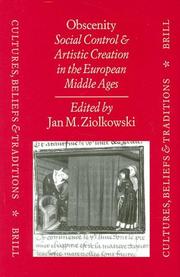
ISSN: 13825364 ISBN: 9004109285 9789004109285 Year: 1998 Volume: . 4 Publisher: Leiden Brill
Abstract | Keywords | Export | Availability | Bookmark
 Loading...
Loading...Choose an application
- Reference Manager
- EndNote
- RefWorks (Direct export to RefWorks)
History of civilization --- anno 500-1499 --- Europe --- Social control --- Arts, Medieval --- Contrôle social --- Censorship --- Arts, European --- Erotica --- Censorship. --- 930.85.42 --- Cultuurgeschiedenis: Middeleeuwen --- 930.85.42 Cultuurgeschiedenis: Middeleeuwen --- Contrôle social --- Eroticism --- Pornography --- European arts --- Arts [Medieval ] --- Arts [European ] --- Arts, Medieval - Censorship. --- Arts, European - Censorship. --- Erotica - Censorship - Europe.
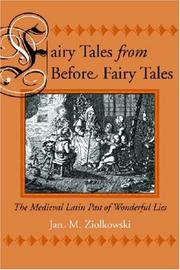
ISBN: 9780472115686 0472115685 Year: 2007 Publisher: Ann Arbor, Mich. University of Michigan Press
Abstract | Keywords | Export | Availability | Bookmark
 Loading...
Loading...Choose an application
- Reference Manager
- EndNote
- RefWorks (Direct export to RefWorks)
When did fairy tales begin? What qualifies as a fairy tale? Is a true fairy tale oral or literary? Or is a fairy tale determined not by style but by content? To answer these and other questions, Jan M. Ziolkowski not only provides a comprehensive overview of the theoretical debates about fairy tale origins but includes an extensive discussion of the relationship of the fairy tale to both the written and oral sources. Ziolkowski offers interpretations of a sampling of the tales in order to sketch the complex connections that existed in the Middle Ages between oral folktales and their written equivalents, the variety of uses to which the writers applied the stories, and the diverse relationships between the medieval texts and the expressions of the same tales in the "classic" fairy tale collections of the nineteenth century. In so doing, Ziolkowski explores stories that survive in both versions associated with, on the one hand, such standards of the nineteenth-century fairy tale as the Brothers Grimm, Hans Christian Andersen, and Carlo Collodi and, on the other, medieval Latin, demonstrating that the literary fairy tale owes a great debt to the Latin literature of the medieval period. Jan M. Ziolkowski is the Arthur Kingsley Porter Professor of Medieval Latin at Harvard University.
Folklore --- Fiction --- sprookjes --- Fairy tales --- Tales --- History and criticism --- History and criticism. --- Classification. --- Contes de fées --- Contes --- Histoire et critique --- Classification --- Tale type indexes --- Fairy tales - History and criticism --- Tales - Classification --- Children's literature. Juvenile literature --- jeugdliteratuur

ISBN: 0812231619 1512809357 0585113769 Year: 1993 Volume: *29 Publisher: Philadelphia University of Pennsylvania Press
Abstract | Keywords | Export | Availability | Bookmark
 Loading...
Loading...Choose an application
- Reference Manager
- EndNote
- RefWorks (Direct export to RefWorks)
Animals in literature --- Animals in poetry --- Animaux dans la littérature --- Animaux dans la poésie --- Beast epic --- Dieren in de literatuur --- Dieren in de poëzie --- Dierenepiek --- Dierenepos --- Dierenfabels --- Dierenromans --- Dierensprookjes --- Dierenverhalen --- Epopées animales --- Fables ésopiques --- Latin poetry, Medieval and modern --- -Animals in literature --- Latin literature, Medieval and modern --- History and criticism --- Latin poetry [Medieval and modern ] --- Poetry as Topic --- Literature, Medieval. --- Animals. --- Animals in literature. --- Animal Population Groups. --- Poetry --- Greek & Latin Languages & Literatures --- Languages & Literatures --- Latin. --- History and criticism. --- Animalia --- Animal --- Metazoa --- Medieval Literature --- Literatures, Medieval --- Medieval Literatures --- Animal Population Group --- Population Group, Animal --- Population Groups, Animal --- Zoology
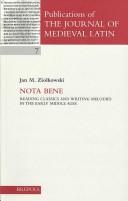
ISBN: 9782503525341 2503525342 Year: 2007 Volume: 7 Publisher: Turnhout: Brepols,
Abstract | Keywords | Export | Availability | Bookmark
 Loading...
Loading...Choose an application
- Reference Manager
- EndNote
- RefWorks (Direct export to RefWorks)
Nota Bene explores a little-known juxtaposition of verbal text and musical notation in the Middle Ages. This particular intersection deserves attention from those interested in music, the reception of classical Latin literature, the history of education, and the development of punctuation.Between the late tenth century and the late twelfth century, the musical notation known as neumes was provided in dozens of manuscripts for, among other texts, a number of Horace's Odes as well as for sections of epics by Lucan, Statius, and Vergil. These materials constitute a paradoxical corpus of "classical poems in plainchant" that complicates our views of both how students learned Latin and what was being sung in an era most often associated with Gregorian chant. The book wrestles first with the literary-historical puzzle of why certain passages and not others were "neumed" and later with the ethnomusicological riddles of how, where, when, and by whom the passages were sung.Jan M. Ziolkowski is Arthur Kingsley Porter Professor of Medieval Latin at Harvard University, and the editor/translator of The Cambridge Songs.
Ligature (Music) --- Neumen --- Neumes --- Latin poetry --- Poésie latine --- History and criticism --- Histoire et critique --- Musical settings --- Poésie latine --- Latin poetry - Musical settings - History and criticism
Book
ISBN: 9780884024002 Year: 2014 Volume: *3 Publisher: Washington DC Dumbarton Oaks Research Library and Collection
Abstract | Keywords | Export | Availability | Bookmark
 Loading...
Loading...Choose an application
- Reference Manager
- EndNote
- RefWorks (Direct export to RefWorks)
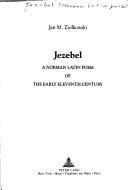
ISBN: 0820409324 Year: 1989 Volume: 10 Publisher: New York (N.Y.) Lang
Abstract | Keywords | Export | Availability | Bookmark
 Loading...
Loading...Choose an application
- Reference Manager
- EndNote
- RefWorks (Direct export to RefWorks)
Christian poetry, Latin (Medieval and modern) --- Poésie chrétienne latine (médiévale et moderne) --- History and criticism --- Jezebel --- Poetry --- In literature --- Bible --- History of Biblical events --- Normandy (France) --- Normandie (France) --- Intellectual life --- Vie intellectuelle --- -Latin Christian poetry, Medieval and modern --- Latin poetry, Medieval and modern --- History and criticisim --- Jezebel Queen, consort of Ahab, King of Israel --- -Jezebel Queen, consort of Ahab, King of Israel --- -In literature --- -Intellectual life --- -History and criticisim --- Poésie chrétienne latine (médiévale et moderne) --- Jezebel, --- Izevel, --- איזבל --- In literature. --- Poetry. --- Intellectual life. --- Biblia --- Basse-Normandie (France) --- Haute-Normandie (France)
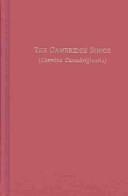
ISBN: 9780866982344 0866982345 Year: 1998 Publisher: Tempe : Medieval and Renaissance texts and studies,
Abstract | Keywords | Export | Availability | Bookmark
 Loading...
Loading...Choose an application
- Reference Manager
- EndNote
- RefWorks (Direct export to RefWorks)
Songs, Latin (Medieval and modern) --- Manuscripts, Latin (Medieval and modern) --- Latin poetry, Medieval and modern --- Scriptoria --- Chansons latines --- Manuscrits latins (médiévaux et modernes) --- Poésie latine médiévale et moderne --- Scriptoriums --- Texts --- Textes --- Manuscrits latins (médiévaux et modernes) --- Poésie latine médiévale et moderne
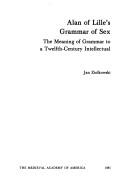
ISBN: 0910956855 9780910956857 0910956863 9780910956864 Year: 1985 Publisher: Cambridge (Mass.): Medieval academy of America
Abstract | Keywords | Export | Availability | Bookmark
 Loading...
Loading...Choose an application
- Reference Manager
- EndNote
- RefWorks (Direct export to RefWorks)
Education, Medieval --- Grammar, Comparative and general --- -Theology, Doctrinal --- -Homosexuality --- -Same-sex attraction --- Sexual orientation --- Bisexuality --- Christian doctrines --- Christianity --- Doctrinal theology --- Doctrines, Christian --- Dogmatic theology --- Fundamental theology --- Systematic theology --- Theology, Dogmatic --- Theology, Systematic --- Theology --- Comparative grammar --- Grammar --- Grammar, Philosophical --- Grammar, Universal --- Language and languages --- Philosophical grammar --- Linguistics --- Philology --- Education --- Medieval education --- Seven liberal arts --- Civilization, Medieval --- Learning and scholarship --- History --- -Religious aspects --- -Christianity --- Doctrines --- Grammar, Comparative --- Alanus de Insulis --- -Criticism and interpretation --- Homosexuality --- Theology, Doctrinal --- Education, Medieval. --- Homosexuality. --- Literature --- Allegorieën. --- Grammatica. --- Metaforen. --- Homoseksualiteit. --- Latijn. --- Fachsprache. --- Grammatik. --- Grammatiktheorie. --- Literatur. --- Mittellatein. --- Theologie. --- Unterricht. --- Alanus --- History. --- Religious aspects --- latin. --- history. --- de Insulis --- d. 1202 --- Criticism and interpretation --- Middle Ages, 600-1500 --- Alanus, --- Alanus (ab Insulis) --- Criticism and interpretation. --- Geschichte 1100-1200. --- Geschichte 500-1500. --- Geschichte 1000-1500. --- Middle Ages, 600-1500. --- Alanus (ab Insulis). --- -History --- -Alain de Lille --- Alano di Lilla --- Alanus ab Insulis --- -Education --- Same-sex attraction --- Alain, --- Alan, --- Alanus de Insulis, --- Alano, --- Insulis, Alanus de, --- Isle, Alain de l', --- L'Isle, Alain de, --- Ryssel, Alain von, --- Montepessulano, Alanus de,
Book
ISBN: 1783745088 1783745061 178374507X Year: 2018 Publisher: Open Book Publishers
Abstract | Keywords | Export | Availability | Bookmark
 Loading...
Loading...Choose an application
- Reference Manager
- EndNote
- RefWorks (Direct export to RefWorks)
"This ambitious and vivid study in six volumes explores the journey of a single, electrifying story, from its first incarnation in a medieval French poem through its prolific rebirth in the nineteenth and twentieth centuries. The Juggler of Notre Dame tells how an entertainer abandons the world to join a monastery, but is suspected of blasphemy after dancing his devotion before a statue of the Madonna in the crypt; he is saved when the statue, delighted by his skill, miraculously comes to life.Jan Ziolkowski tracks the poem from its medieval roots to its rediscovery in late nineteenth-century Paris, before its translation into English in Britain and the United States. The visual influence of the tale on Gothic revivalism and vice versa in America is carefully documented with lavish and inventive illustrations, and Ziolkowski concludes with an examination of the explosion of interest in The Juggler of Notre Dame in the twentieth century and its place in mass culture today.The Juggler of Notre Dame and the Medievalizing of Modernity is a rich case study for the reception of the Middle Ages in modernity. Spanning centuries and continents, the medieval period is understood through the lens of its (post)modern reception in Europe and America. Profound connections between the verbal and the visual are illustrated by a rich trove of images, including book illustrations, stained glass, postage stamps, architecture, and Christmas cards.Presented with great clarity and simplicity, Ziolkowski's work is accessible to the general reader, while its many new discoveries will be valuable to academics in such fields and disciplines as medieval studies, medievalism, philology, literary history, art history, folklore, performance studies, and reception studies."
Civilization, Medieval --- Medievalism. --- Middle Ages --- Influence. --- Historiography. --- Medieval civilization --- Civilization --- Chivalry --- Renaissance --- Medievalists --- History --- Tombeor Nostre Dame. --- Jongleur de Notre-Dame --- The Juggler of Notre Dame --- reception studies --- Modernity --- medieval studies --- medievalism --- philology --- literary history --- art history --- folklore --- performance studies --- Anatole France --- France --- Gaston Paris --- Paris
| Listing 1 - 10 of 50 | << page >> |
Sort by
|

 Search
Search Feedback
Feedback About UniCat
About UniCat  Help
Help News
News